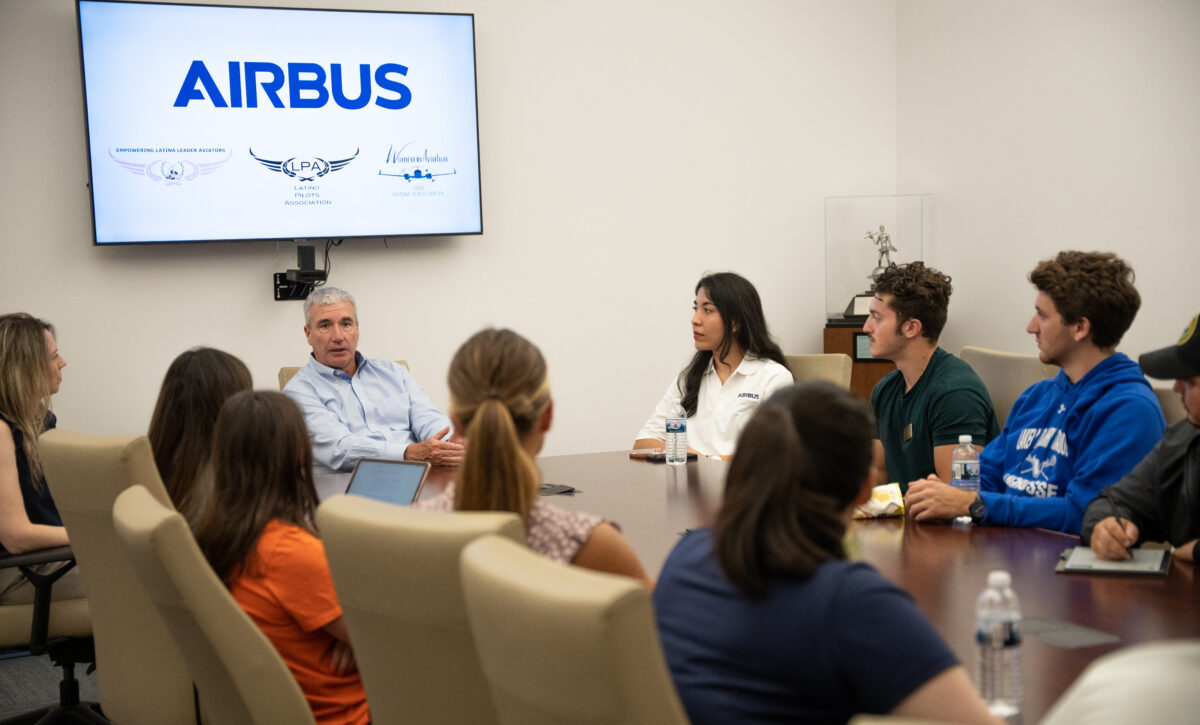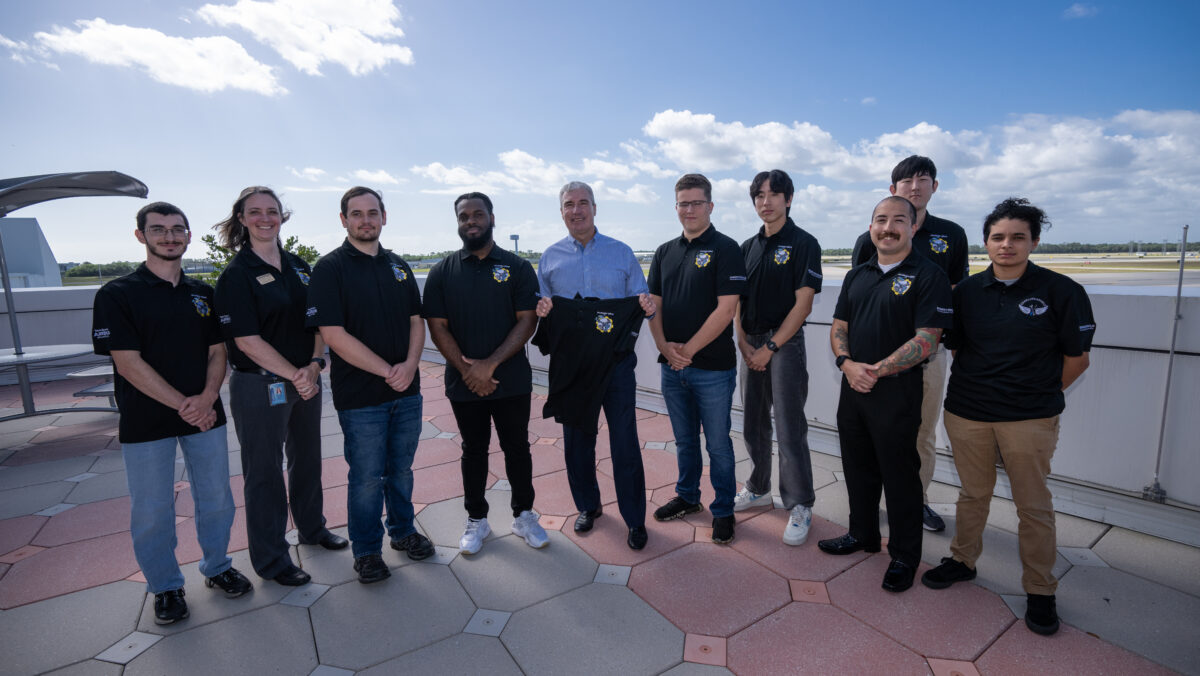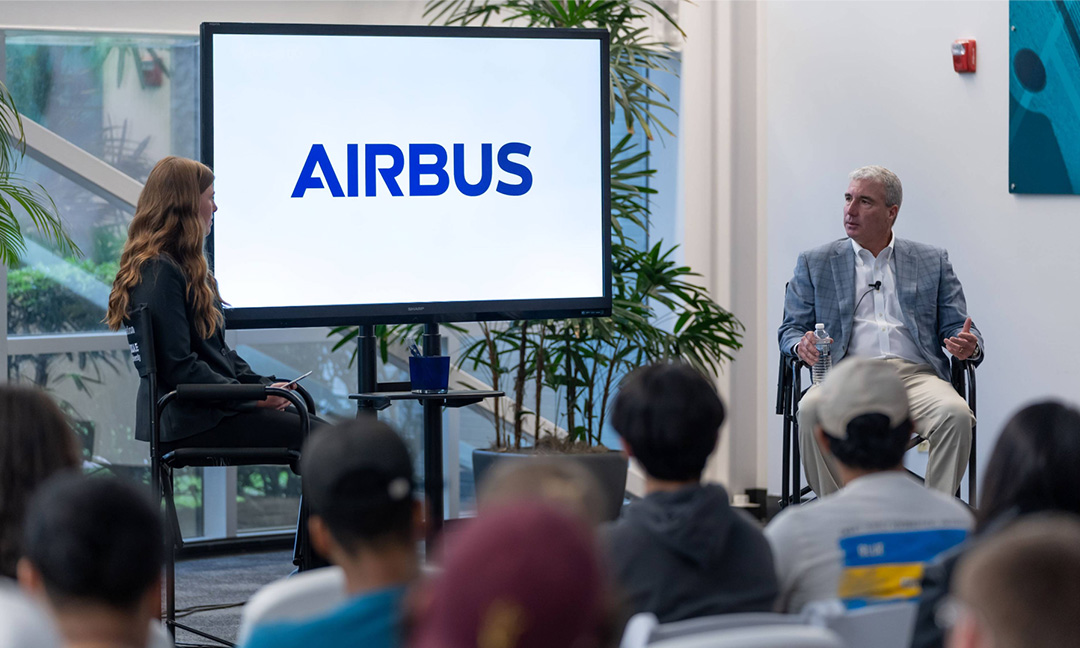During his visit to the Embry-Riddle’s Daytona Beach Campus, the Chairman and CEO of Airbus Americas shared that when he attends events, everyone is always curious about aviation, regardless of whether they actually work in the industry.
“Everybody wants to talk about aviation,” Jeff Knittel (’80) says. “What about this airplane? How does air traffic management work?”
It’s exciting to see such interest in our industry, and “You are in the middle of that,” he told students during his Plane Talk for Aviation Week 2023.
After graduating with a degree in Aviation Management, Knittel took a job with Cessna Finance. He was soon offered a job as a regional salesman, which involved learning to fly an airplane to demonstrate the aircraft to customers. But he was not qualified as a pilot, so he became one. The experience helped him understand that each of us must continue to adapt and learn to meet the demands of and thrive in each successive role.
“When you get into the industry, Embry-Riddle is going to give you a phenomenal foundation to build on, but it’s up to you to grow your skills.”
— Jeff Knittel (’80)
When he started at CIT Group, a commercial leasing company, he made the switch from general aviation to commercial aviation, which was another area where he didn’t have in-depth knowledge. But he worked long hours to learn and be better while also commuting three-and-a-half hours roundtrip to New York City by bus.
“It’s the single best thing that happened to me early in my career,” he says of the commute. He would read four newspapers a day plus trade journals from Aviation Week to Flight International. And within a year or two he had surpassed the learning curve from general to commercial aviation with the help of many people in the industry. Ultimately, he became president of CIT Transportation Finance in New York.
“If I wasn’t reading those newspapers every day or trade pubs every single day, I felt like I was at a huge disadvantage — that I’m going to be making a decision without all the facts,” he says.
Though his commute time decreased over the years, he still devoted that time to gathering intelligence about the industry and the world. “It allowed me to gain the knowledge that you can’t get in the office where you’re fighting battles every day,” he says.

“When you get into the industry, Embry-Riddle is going to give you a phenomenal foundation to build on, but it’s up to you to grow your skills,” he says.
The key to any job starts with passion for the industry. “When I was thinking about coming to Embry-Riddle, it was all about love for aviation, which I think all of you have,” Knittel says.
Another critical success factor is being able to build teams, he says.
“Remember, it’s not one person — we all do this together,” Knittel says. “Building those relationships is really important because companies aren’t just looking for a star. It’s fine to be a star, but it’s much better to be someone who helps to bring a team along because it makes everyone better.”
Madison Seymour, a certified flight instructor majoring in Aeronautical Science, interviewed Knittel at the event, particularly about his role at Airbus.
Aside from preparing for a production ramp-up to meet aircraft demand, ramping up hiring in Canada and the U.S., and growing the market for Airbus Helicopters, Knittel’s work extends into the defense, space and cyber fields.
“Early on, we were the little engine that could,” Knittel says of Airbus. “It’s a 50-year-old company, but it started as a small company. You go back to the late ’90s and on the commercial side of the business, we had about a 17% market share. When you look at order books today, we’re in excess of 50%.”
Knittel chairs the company’s Silicon Valley innovation unit, Acubed, and is a member of the Airbus Canada Limited Partnership Board, a joint venture of Airbus and the Province of Quebec that is one of two assembly lines that produces what he calls the world’s most modern commercial aircraft – the A220.
He is also a member of the board for Airbus Ventures, which focuses on investing in early-stage technologies. One example is SpinLaunch, a company that developed a kinetic system intended to launch satellites into low Earth orbit through electrically generated spin. Investing in new technology enables the company to advance the industry and improve its own products, he says.
A student asked about the development of the A321XLR, a single-aisle airplane with a range of 4,700 nautical miles. The aircraft is uniquely designed with the addition of a rear center tank that will enable the aircraft to bypass hubs and go directly between secondary and tertiary cities. “The XLR will help change the dynamic of the industry,” Knittel says.

Another company focus is sustainability.
“Everything we do also has a focus on sustainability,” Knittel says. Of the €3 billion the company invests annually in research and development, a large part is devoted to pursuing sustainable solutions. The company is pursuing low-carbon sustainable aviation fuel (SAF), and has already achieved the ability to fly with 50% SAF on all its aircraft. Knittel adds that the company believes hydrogen fuel is the ultimate goal.
“We believe hydrogen is the answer because it really has a zero-carbon footprint. Now hydrogen is hard. But that’s kind of what we do, right? We’re in aviation. We find solutions to difficult problems.”
He remains in awe of the possibilities within aviation today, from commercial to general aviation to space, helicopters and cyber. “You are really, really lucky to be in this industry,” he told his audience of Embry-Riddle students.
“Be thankful that you’re in a great place,” Knittel. “You’re going to learn great things, but it’s going to be hard. You’re going to have to power through it. And you will.”
